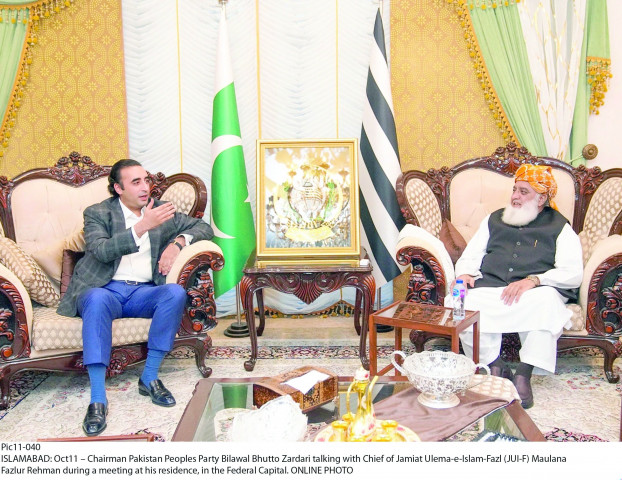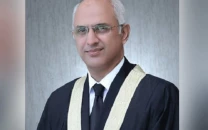Ruling coalition faces 'Herculean task' on 26th amendment bill
PML-N, PPP drafts shed light on judicial reforms, Fazl adamant on reaching political consensus, Parliamentary meet

The much-touted constitutional package of the government -- 26th Constitution Amendment Bill -- surfaced during a parliamentary panel meeting on Friday, shedding light on the ruling coalition's willingness to go to great lengths to address what it describes as "a historic wrong", as details of the draft bill crafted by the PPP also emerged.
Moreover, JUI-F chief Maulana Fazlur Rehman, who has emerged as the key player in any effort to pass the amendment, emphasised the need for reaching a consensus among political forces before tabling the bill for a vote in parliament.
The federal government tabled an "incomplete" draft of constitutional amendments before the National Assembly's special committee on Friday, proposing the creation of a Federal Constitutional Court (FCC). The draft suggests a retirement age of 68 years for the FCC's chief justice, with a fixed three-year term if the top judge has already served in the Supreme Court.
The ruling Pakistan Muslim League-Nawaz (PML-N) draft also stipulates that the chief justice of the Supreme Court shall serve a three-year term or retire at the age of 65, whichever comes first.
Federal Minister for Law and Justice Azam Nazeer Tarar presented the much-discussed 26th constitutional amendment before the committee, only for the members to immediately criticize it as incomplete.
The government's draft focuses solely on judiciary-related amendments, a committee member told The Express Tribune. According to the member, the law minister informed the committee that he would seek further guidance on other amendments and present them in the next meeting, scheduled for Saturday (today).
The nine-page draft features two columns: one outlining the government's proposals and the other listing suggestions from the legal fraternity.
Meanwhile, the Pakistan Peoples Party Parliamentarian (PPPP), a key government ally, released its own version of the proposed amendments to the media. The main difference between the two drafts is that while PML-N suggests the FCC at the federal level, the PPPP seeks to establish similar courts at the provincial level as well.
A source within the committee revealed that other parties, including Pakistan Tehreek-e-Insaf (PTI) and Jamiat Ulema-e-Islam-Fazl (JUI-F), are also working on their own drafts, with PTI expected to present theirs soon.
The source noted that PTI's participation marked a step toward creating a more collaborative environment, raising hopes for a consensus on a final, unified draft.
Power, formation of judicial commission
Meanwhile, Law Minister Azam Nazeer Tarar while talking to the media clarified that the power and formation of the judicial commission have been outlined in the proposed constitutional amendments.
Tarar said that several proposals were discussed during the meeting, adding that another round will be held on Saturday to continue the discussions.
The minister further said that the anxiety surrounding the issue has now eased, and the amendments include provisions for the establishment of a constitutional court and the transfer of judges.
He also said that JUI-F chief Maulana Fazlur Rehman has been invited to share his suggestions on the matter as well. The JUIF has already shared that it has been working on its draft, which will soon be shared with all.
Government's draft
The government's draft proposes the insertion of new Article 178-A (retiring age) in the Constitution. The newly proposed article states: "A judge of the Federal Constitutional Court shall hold office until he attains the age of sixty-eight-years, unless he sooner resigns or is removed from office in accordance with the Constitution".
It adds: "Provided that where a person who has held the office of a Judge of the Supreme Court is appointed as a Judge of the Federal Constitutional Court, he shall hold the office for a term of three years unless he sooner resigns or is removed from office in accordance with the Constitution."
Moreover, it maintains, "if such a judge is appointed as the Chief Justice, his term as the Chief Justice shall end on completion of the aforesaid three-year term." It further provides that the term of the CJ FCC shall be three years. The CJ FCC shall stand retired notwithstanding his age of superannuation on the completion of his term.
Amendment in Article 179 deals with the retiring age of the chief justice of the Supreme Court. A new proviso in Article 179 states: "provided that the term of the Chief Justice of the Supreme Court shall be three years or unless he sooner resigns or attains the age of sixty-five years or is removed from his office in accordance with the Constitution, which is earlier."
The government's draft also suggests the substitution of Article 186-A (power of FCC and SC to transfer cases) of the Constitution. It proposes that: "The Supreme Court may, if it considers it expedient to do so in the interest of justice, transfer any case, appeal or other proceedings, other than the proceedings under Article 199, pending before any High Court to any other High Court."
Clause 2 states: "The Federal Constitutional Court shall have the power to transfer any proceedings instituted under Article 199 before any High Court to any other High Court or to itself."
Amendment in Article 193 (2)(a)(b) of the Constitution states that "A person shall not be appointed as a Judge of a High Court unless he is a citizen of Pakistan and does not hold citizenship of a foreign State, is not less than forty years of age".
The government side's draft proposes the insertion of a new article 175B (Constitution of Federal Constitutional Court) of the Constitution. It states: "The Federal Constitutional Court shall consist of a Chief Justice to be known as the Chief Justice of the Federal Constitutional Court of Pakistan and so many other judges as may be determined by Act of Majlis-e-Shoora (Parliament) or, until so determined, as may be fixed by the President".
It further provides that "each Province shall have an equal number of Judges in the Federal Constitutional Court." Its clause 2 adds that the "President may, by Order, make necessary provisions for the matters consequential or ancillary to the establishment and functioning of the Federal Constitutional Court."
The proposed amendments in Article 175-A deal with the appointment of the judges of the proposed FCC, SC, high courts and Shariat Court, adding that the expression "and for performance evaluation of Judges of the High Courts" shall also be inserted in clause B.
Next, it defines the process for the appointment of the judges of the high courts and the FCC, defining what the commission will consist of.
The commission will consist of a chief justice and two senior most judges each of the FCC and SC; a law minister; an attorney general for Pakistan; a senior advocate (20 years' experience) nominated by the Pakistan Bar Council; and two members each from the National Assembly and Senate (one from treasury and one from opposition from both houses).
Its clause (2C) states that the chief justice of the FCC shall be appointed on the recommendation of the National Assembly committee from among the three senior judges of the FCC, saying the committee shall send the name of the nominee of the prime minister who shall forward the same to the president for the appointment.
The first chief justice of the FCC will be appointed by the president based on the prime minister's advice. Additionally, the president will appoint the first judges of the FCC in consultation with the chief justice.
According to Clause 2(D), the National Assembly committee will comprise eight members nominated by the speaker of the National Assembly.
Govt confident in numbers: Bilawal
Addressing a press conference following the meeting, PPP Chairman Bilawal Bhutto stated that the government has given him one month to reach a consensus on constitutional amendments concerning judicial reforms.
He noted that only the final document from the PPP has been released, while the draft from JUI-F has not been formally received, even though the PPP's draft has been with JUI-F leader Kamran Murtaza for over a week.
In response to a question, Bilawal said that the federal government was confident in its numbers.
He mentioned that the law minister claimed they possess a two-thirds majority, yet he was present in the committee to facilitate a consensus among all political parties on the issue.
"If the consensus takes longer than anticipated," he said, "the government may exercise its constitutional right and move forward."
However, he stressed that the PPP was committed to making its best efforts and has consistently maintained that a complete consensus should be established.
Bilawal further remarked that if the government indeed holds a two-thirds majority but still seeks a consensus, it is commendable.
He questioned how long the government would wait and provide space for negotiation, stating, "I am trying my best to continuously engage and present an agreed draft to the government through political consultation."
The PPP's draft includes the establishment of a constitutional court at both federal and provincial levels, along with proposed amendments to Articles 175 A, B, D, E, and F.
Bilawal mentioned that some points have emerged in the government's draft, but he has also requested the government to share points beyond those related to judicial reforms.
He acknowledged that there will likely be some points aligned with the government's own manifesto, adding that PML-N has the right to amend the constitution according to the Charter of Democracy.
He revealed that Maulana reiterated his position of wanting to create a draft by consensus with the PPP.
The PPP also reaffirmed that constitutional amendments should be made by consensus with the political parties, stating, "Our efforts are aimed at creating a consensus draft".
'Constitutional court at provincial level'
Speaking on the Express News program 'Centre Stage' on Friday, Bilawal Bhutto asserted that the PPP advocated for the establishment of constitutional courts at both the federal and provincial levels, in contrast to the PML-N, which proposes a constitutional court solely at the federal level.
Bilawal expressed optimism about achieving a consensus on constitutional amendments, stating that it is the responsibility of political parties to resolve issues amicably.
"Maulana Fazlur Rehman is ready to be on board. The government must be considering how to secure the necessary numbers for constitutional amendments following the verdict on the Article 63-A review petition. However, I am working to persuade the government that legislation should be accomplished through consensus," he said.
The PPP chairman stressed, "We want the supremacy of the Constitution, and those who interpret the Constitution must fulfil their responsibilities diligently. I had a productive meeting with Nawaz Sharif, and the tasks that were left unfinished in the past can now be completed."
Bilawal noted that there was little difference between the drafts proposed by the PPP and JUI-F, expressing hope that the final draft of the constitutional amendment will emerge through consensus.
Sharing insights from the committee meeting, he indicated that the PPP presented its draft, which includes a proposal for a constitutional court at the provincial level, while the PML-N draft only mentions a constitutional court at the federal level.
He deemed the Supreme Court's verdict on Article 63 A as unconstitutional, adding that the government faced challenges due to this erroneous decision. However, he believes that the recent ruling on the Article 63 A review petition will assist the government in passing constitutional amendments with a two-thirds majority.
"We advocate for separate courts to handle criminal cases and constitutional matters to ensure prompt justice. In the past, the courts have misused their powers to disqualify prime ministers instead of protecting the people," concluded the PPP chairman.
Fazl expresses conditional support
Meanwhile, Maulana while addressing a press conference expressed conditional support for the government's proposed constitutional amendments, emphasising the need for consensus among political forces.
Speaking to journalists in Islamabad, Maulana said that his party could back the government's "constitutional package" if their proposals were included in the final draft. "We can agree on a very suitable draft if our proposals are accepted," he said.
Regarding the ongoing constitutional amendment discussions, he stated, "Progress has been made in the constitutional amendment process, and copies of the draft were distributed in today's parliamentary committee meeting. From today, we will begin discussions, and we are open to a consensus, provided our suggestions are incorporated."
He also extended an invitation to other opposition parties to join forces on the matter, stressing that a consensus on a well-crafted amendment is possible if all voices are heard.
Earlier, the government's much-touted constitutional amendment remains in limbo as consensus eluded the meeting of the parliamentary committee set up to debate the package.
The committee, led by PPP's Khursheed Shah, has the representation of all parties, including the PTI. It was formed by the National Assembly speaker for reconciliation among lawmakers, particularly between the PTI and the government, after a raid by plainclothesmen to round up the PTI men from the Parliament House.
The parliamentary committee meeting took place where major political parties, including the PML-N, PPP, PTI and JUI-F, discussed drafts for the constitutional package.
PTI leaders Amir Dogar and Barrister Ali Gohar were also present at the meeting.
Gohar said that the PTI would give suggestions when a detailed draft was presented. "We have not seen anything from the government," he said.
Meanwhile, Dogar said that the government's draft "has ambiguity" and it should present plans to the committee with clarity. He said further committee meetings would be held.
"The amendment requires more time," he said, adding, "We will talk with party members and experts, and with Maulana Fazlur Rehman as we have an understanding."



















COMMENTS
Comments are moderated and generally will be posted if they are on-topic and not abusive.
For more information, please see our Comments FAQ